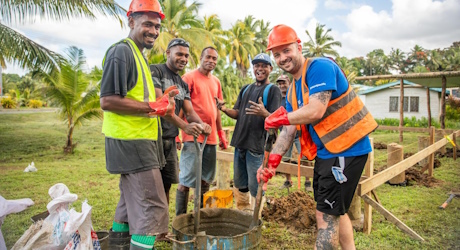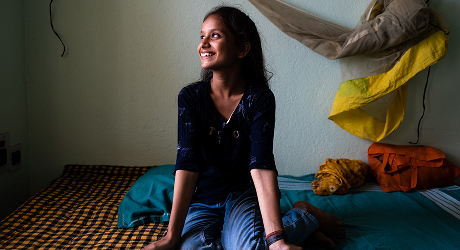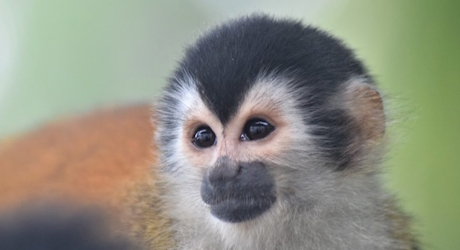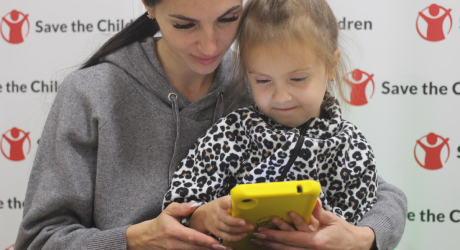Footprints Project
Since 2005, travelers like you have helped us change the world through micro-donations.
.jpg)
-
A total of
4709
Travelers
-
donated
$30004.05
(100% funded) -
to help improve
Water & Sanitation
-
impacting
39046
people -
in
Ghana
Project Background
Many communities in Ghana have no, or limited access to, improved fresh water sources, basic sanitation, and hygiene facilities. This has led to an increase in waterborne illnesses. Women are often the most affected group as they must go long distances to fetch water, which is both unproductive and unsafe.
Increased access to clean water is crucial to decreasing disease and to empowering women. Without the need to travel so far for fresh water, women have more time for their own financial or personal pursuits, improving the quality of life for entire families and communities.
In addition, more than 78% of the world’s poorest people live in rural areas and are dependent primarily on agriculture and related activities for their livelihood. These smallholder farmers are highly vulnerable to environmental destruction, water shortages and climate change. The Hunger Project’s program helps solve water scarcity issues by empowering rural communities to promote water conservation techniques and develop new water resources.
Key Project Activities
The Hunger Project’s ‘Water for Ghana’ Program trains local volunteer leaders (Animators) to increase community awareness on hygiene and improved sanitation facilities (latrines, rubbish pits, hand washing facilities, drying lines etc.), drilling new boreholes, establishing and training community water point committees, and improving school water access and sanitary services.
The Hunger Project:
- empowers local communities to drill new wells and boreholes, repair existing water sources, build and repair water towers, and construct water troughs for livestock
- provides equipment and training for testing and pumping water
- trains volunteers on the use and repair of water pumps and generators, and on water safety and purification
- lobbies local governments to devote public resources to water infrastructure projects
- mobilises communities to initiate drip irrigation projects (which minimise the use of water and fertiliser by allowing water to drip slowly to the roots of plants) and to develop water catchment systems (which collect rainwater from a roof or other surface before it reaches the ground and store it for future use)
Project Objectives
- Reduce incidence of waterborne illnesses
- Increase access to, and use of, improved water sources
- Increase access to, and use of, improved sanitation facilities
- Increase awareness of the importance of hygiene and improved sanitation facilities
Key Project Outcomes
In Ghana, The Hunger Project (THP) works in eight Epicentres across 68 village communities, transforming more than 39,040 lives. In 2022 alone, there were 38 Water, Sanitation, and Hygiene (WASH) workshops with a total of 2,228 participants. Some highlights:
Baware Epicentre: THP collaborated with the Environmental Health Department and teachers to promote WASH education, distribute WASH stations, and establish WASH clubs in the various schools within the community area.
Supriso Epicentre: The community’s borehole was damaged in 2022 and there was no proper Water and Sanitation Management system in place. A committee was trained on sanitation, water management, and financial management and began charging fees for the water fetched, allowing for the repair and routine maintenance of the borehole.
Konkoney Epicentre: The Epicentre building was renovated, leading to an increase in Epicentre activity participation, and funding support allowed new leaders to be identified and trained. The mechanised borehole has also been repaired to provide safe water to the health clinic for improved health care services.
Adonkwanta Epicentre: The Adonkwanta community added seven additional boreholes to the existing nine for water access – a 78% increase in access to clean water for the community.
Community Involvement
The ‘Water for Ghana’ Program is run by The Hunger Project Ghana team working closely alongside our team of Animators. Some examples of community partnership:
- The Baware Epicentre is working in close collaboration with relevant district assembly agencies including Ghana health service, Ghana education service, Business Advisory council and social welfare departments for support with technical knowledge for the volunteer leaders and communities.
- Akode Epicentre has a working partnership with most of the government agencies in the district, namely, Ghana Health Service, Ghana Education Service, Social Welfare Department, Ministry of Agriculture, Okere District central Administration, etc.
- Epicentre leadership in Apau Wawase has established a strong community animators’ system which includes chiefs and elders that will support in the mobilisation of partners towards self-reliance in 2024.
Village Partner Stories
Elizabeth Awisi is a mother of six from the Osorase community in Ghana. She is a retired teacher and farmer.
“I offered myself as a volunteer to be a WASH Animator at the Epicentre when the Epicentre was selecting leaders for the WASH program,” she told us. “After my first training workshop, I learnt and got insight into many issues we were compromising on in our homes with regards to sanitation and personal hygiene.
“As I tried to educate my community members on sanitation issues, I came across some unhealthy development issues with implication on the sanitation and hygiene of the entire community. A contractor is overseeing a school building construction in the community and had directed the washroom drains that are also seeping into the borehole water source from which we fetch water for drinking and for other domestic uses.
“I realised this will be a serious pollution case and therefore engaged with the contractor to avoid the consequences. Together with the assembly member of the area, we were able to work with the contractor to re-channel the drainage course. I think that I was able to do this because of the enlightenment and education I have received from becoming a WASH animator.”
What's Next?
It’s an exciting time with active programs run in all eight Ghana Funding Network Epicentres in 2023. In 2024, Apau Wawase, Akode, Baware, Supreso and Konkoney are expected to reach Self-reliance (when community members are confident and have the capacity and skills to act as agents of their own development).
As all Epicentres in our Ghana Funding Network are in Phase 4 of their Epicentre journey, for the remainder of this year their focus will be on continuing to strengthen their leadership and finish program implementation as they prepare for Self-reliance. Our important WASH program will continue to run in Ghana and in the other communities we work in globally. We know that improved fresh water sources, basic sanitation, and hygiene facilities is key to the sustainable end of hunger and poverty.
Traveling soon? When you buy travel insurance with us, you can make a contribution towards a cause you care about.
Get a quote






